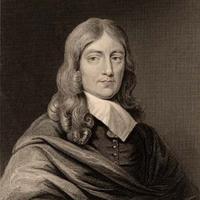01b. Life of John Milton by Sir Richard C. Jebb. Part 2/4.
Milton's father had settled at Horton in Buckinghamshire. Thither the son retired in July, 1632. He had gone to Cambridge with the intention of qualifying for some profession, perhaps the Church. This purpose was soon given up, and when Milton returned to his father's house he seems to have made up his mind that there was no profession which he cared to enter He would choose the better part of studying and preparing himself, by rigorous self-discipline and application, for the far-off divine event to which his whole life moved. It was Milton's constant resolve to achieve something that should vindicate the ways of God to men, something great that should justify his own possession of unique powers—powers of which, with no trace of egotism, he proclaims himself proudly conscious. The feeling finds repeated expression in his prose; it is the guiding-star that shines clear and steadfast even through the mists of politics. He has a mission to fulfil, a purpose to accomplish, no less than the most fanatic of religious enthusiasts; and the means whereby this end is to be attained are devotion to religion, devotion to learning, and ascetic purity of life.
This period of self-centred isolation lasted from 1632 to 1638 Gibbon tells us among the many wise things contained in that most wise book the Autobiography, that every man has two educations: that which he receives from his teachers and that which he owes to himself, the latter being infinitely the more important. During these five years Milton completed his second education, ranging the whole world of classical antiquity and absorbing the classical genius so thoroughly that the ancients were to him what they afterwards became to Landor, what they have never become to any other English poet in the same degree, even as the very breath of his being, pursuing, too, other interests, such as music, astronomy and the study of Italian literature; and combining these vast and diverse influences into a splendid equipment of hard-won, well-ordered culture. The world has known many greater scholars in the technical, limited sense than Milton, but few men, if any, who have mastered more things worth mastering in art, letters and scholarship. It says much for the poet that he was sustained through this period of study, pursued ohne Hast, ohne Rast, by the full consciousness that all would be crowned by a masterpiece which should add one more testimony to the belief in that God who ordains the fates of men. It says also a very great deal for the father who suffered his son to follow in this manner the path of learning.
True, Milton gave more than one earnest of his future fame. The dates of the early pieces—L'Allegro, Il Penseroso, Arcades, Comus and Lycidas—are not all certain; but probably each was composed at Horton before 1638. Four of them have great autobiographic value as an indirect commentary, written from Milton's coign of seclusion, upon the moral crisis through which English life and thought were passing, the clash between the careless hedonism of the Cavalier world and the deepening austerity of Puritanism. In L'Allegro the poet holds the balance almost equal between the two opposing tendencies. In Il Penseroso it becomes clear to which side his sympathies are leaning. Comus is a covert prophecy of the downfall of the Courtparty, while Lycidas openly “foretells the ruine” of the Established Church. The latter poem is the final utterance of Milton's lyric genius. Here he reaches, in Mr Mark Pattison's words, the highwater mark of English verse; and then—the pity of it—he resigns that place among the lyrici vates of which the Roman singer was ambitious, and for nearly twenty years suffers his lyre to hang mute and rusty in the temple of the Muses. The composition of Lycidas may be assigned to the year 1637. In the spring of the next year Milton started for Italy. It was natural that he should seek inspiration in the land where many English poets, from Chaucer to Shelley, have found it. Milton remained abroad some fifteen months. Originally he had intended to include Sicily and Greece in his travels, but news of the troubles in England hastened his return. He was brought face to face with the question whether or not he should bear his part in the coming struggle; whether without self-reproach he could lead any longer this life of learning and indifference to the public weal. He decided as we might have expected that he would decide, though some good critics see cause to regret the decision. Milton puts his position very clearly in his Defensio Secunda: “I thought it base to be travelling for amusement abroad, while my fellow-citizens were fighting for liberty at home.” And later: “I determined to relinquish the other pursuits in which I was engaged, and to transfer the whole force of my talents and my industry to this one important object” (i.e. the vindication of liberty).

